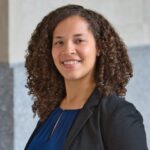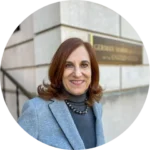Tuesday, July 22, 2025 from 10:30AM – 12:00PM (ET)
Webcast (Online Only)
Event Summary:
On July 22, 2025, the Global Taiwan Institute (GTI) hosted a webinar entitled “Taiwan’s Global Impact: Reflections from TUPP 2025 Fellows.” The discussion featured four fellows: Kayla Orta, Nonresident Fellow in the Indo-Pacific Security Initiative at the Atlantic Council; Julia Mykhailiuk, Research Fellow at FP21; Johanna M. Costigan, Associate Director of Research at the Paulson Institute; and Thomas König, China Director at the German Chamber of Industry & Commerce (DIHK). The event was moderated by GTI Programs Coordinator Ben Levine and German Marshall Fund (GMF) Indo-Pacific Program Managing Director Bonnie S. Glaser. The panel began with each fellow sharing their major takeaways from TUPP, which they also wrote about in the latest installation of the “Next-Generation Perspectives on Taiwan” compendium published by GMF.
Kayla Orta, whose research and policy expertise lies in South Korea, began the discussion by touching on three major areas of cooperation she anticipates for South Korea and Taiwan. Firstly, she talked about Korea’s role in including Taiwan in the Asia Pacific Economic Cooperation (APEC): thanks to the mediation efforts of South Korean diplomat Lee See-young, both the PRC and Taiwan, under the name “Chinese Taipei,” become APEC members simultaneously. This year, South Korea will host APEC’s annual summit conference, and Orta suggested that Taiwan might have a chance in Korea’s friendly environment to establish itself as a leader in global economic matters. Secondly, she identified space technology as a new frontier for Taiwan with international dimensions. Like semiconductors, satellite communications lie at the vital intersection of national security and scientific advancement. Moreover, this industry lends itself particularly well for cooperation with other space agencies, such as NASA, KASA (Korea Aerospace Administration) and JAXA (Japan Aerospace Exploration Agency). She expressed her hope that TASA (Taiwan Space Agency) will not only grow within Taiwan but also collaborate with space agencies around the world to develop safe, fair space policy. Lastly, Orta pointed to nuclear energy, and specifically nuclear waste management, as a shared area of interest between Korea and Taiwan. Korea just passed legislation on the storage and disposal of waste. As Taiwan looks to either build more reactors or shut them down like they did in May this year, Orta hopes that Taiwan can learn from Korea’s nuclear policymaking.
Our second panelist, Julia Mykhailiuk highlighted Taiwanese leadership in international artificial intelligence (AI) governance and the significance of emerging technologies in protecting Taiwan’s digital infrastructure and information space. First, she emphasized that Europe and the world can learn from Taiwan as a high-tech democratic society operating under continuous pressure from gray zone tactics, election interference, and other immediate risks. Beyond the island’s global semiconductor dominance, Taiwan’s AI governance frameworks offer valuable lessons regarding efficiency, transparency, and the role of civil society. Taiwan’s security mechanisms are defined by community resilience as a central defense: they incorporate crowdsourced fact-checking and other civic tech tools to provide early warning systems and counter disinformation daily. However, despite these measures, cyber attacks and information operations are on the rise, accelerated by generative AI. In response to these evolving threats, Taiwan is investing in its own AI capabilities, including building local large language models (LLMs) trained on Taiwan-specific data to reduce dependencies on foreign platforms. However, subtler tactics—for example, LLM data poisoning and biased AI systems trained by malicious state actors—work to erode democratic trust in a manner that is harder to detect. Positioned together at the intersection of AI and national security, Taiwan and Europe face similar challenges brought by China and Russia and therefore would benefit from deeper knowledge exchange: Taiwan can show Europe how to respond to gray zone attacks in real time and how to embed civil society into AI governance, while existing European legal frameworks—such as the EU AI Act, the world’s first binding AI law—can inspire Taiwan to transform democratic values such as fairness and accountability into concrete policy. These complementary models would pioneer a democratic playbook for effective AI governance, bringing structure and scale to Taiwan and speed and adaptability to Europe. Overall, Mykhailiuk appreciated that programs like TUPP help break participants out of policy silos and prompt collaborative thinking and dialogue across disciplines.
After Mykhailiuk, Johanna M. Costigan shared her observations on Taiwan Semiconductor Manufacturing Company (TSMC, 台灣積體電路製造公司), specifically its recent initiatives to build overseas factories in the United States and Germany. Costigan emphasized that although some political leaders are frustrated with TSMC’s decision to keep the majority of its research and production in Taiwan, “exporting the supply chain” is no easy task. She highlighted the decades of “patient industrial policy” undertaken by the Taiwanese government in collaboration with TSMC founder and CEO Morris Chang (張忠謀). She urged business community members, particularly those close to the Trump administration, to help policymakers outside of Taiwan understand that transplanting Taiwan’s sophisticated semiconductor infrastructure will similarly take years of thoughtful, diligent policymaking. She suggested that if the US wished to make itself more attractive for TSMC production, one way to signal interest would be to shift away from isolationist rhetoric. Costigan finished her opening remarks by reminding everyone that the best way to preserve the semiconductor supply chain is to ensure that TSMC’s tried-and-true practices in Taiwan are not endangered by territorial or political aggressions from the PRC: “if we really want a secure, advanced semiconductor supply chain, then we need to secure Taiwan, not mine it of its talent and of its manufacturing capacity” (38:51).
Thomas König concluded the seminar with a call to action on strengthening cooperation between Germany, Europe, and Taiwan. With an extensive background in German-Chinese trade and economic relations, König’s enriching TUPP experience prompted him to approach Taiwan from a new national security angle. TUPP helped him see different perspectives on Taiwan in addition to business and policy, such as new insights into civil society actors as well as the role Taiwan will continue to play on the world stage. As one of Taiwan’s top trading partners, Germany has clear economic interests in the island, as does the rest of Europe. By enshrining the importance of Taiwan in policy language and making these economic ties explicit, there is room for German and European policymakers to adjust their stance more supportively towards Taiwan while maintaining the status quo. Expanding collaboration with Germany, whether through cybersecurity, maritime security, or other knowledge exchange programs, is part of a larger goal of expanding European engagement in Taiwan, an important factor for global stability in consideration of its crucial semiconductor industry. Already, TSMC’s new chip manufacturing fab in Dresden has asserted Germany’s place in the semiconductor supply chain and cemented the deep economic and technological ties between Germany and Taiwan. In consideration of shifting security dynamics and the unclear position of the US on Taiwan, König believes now is the time for Europe to act confidently to protect its interests as both a regional and global actor.
Event Description:
The Global Taiwan Institute (GTI) is pleased to invite you to a panel discussion titled “Taiwan’s Global Impact: Reflections from TUPP 2025 Fellows.”
Now in the second year of the Lai Administration, Taiwan continues to navigate a complex regional and global landscape shaped by geopolitical tensions, disinformation threats, and economic uncertainty. As Taiwan works to strengthen its democratic institutions and global partnerships, building long-term partnerships remains a central policy priority. Featuring perspectives from 2025 participants in the Taiwan-US-Europe Policy Program and drawing upon each participant’s unique background expertise, this panel will include discussions of how their experiences in Taiwan have impacted their work, and the ways in which Taiwan can strengthen its resiliency against authoritarian pressure.
The Taiwan-US-Europe Policy Program (TUPP) is a groundbreaking two-week program that was launched in 2017. Initially designed to enhance the understanding of Taiwan among future US policy leaders, the program was expanded to include future European policy leaders starting in 2022. TUPP consists of two consecutive components: seminars in Washington, DC and a research trip to Taiwan. Organized by the German Marshall Fund (GMF) and co-funded by GTI, the Henry Luce Foundation and the Taiwan Foundation for Democracy, TUPP provides a unique opportunity for the emerging leaders from the United States and Europe to gain the necessary personal experiences in Taiwan that will enable them to appreciate Taiwan’s perspectives on cross-Strait matters, Taiwan’s role in the world, and the importance of US-Taiwan relations.
The panelists include: Johanna M. Costigan (Paulson Institute), Thomas König (German Chamber of Industry & Commerce), Julia Mykhailiuk (FP21), and Kayla Orta (Atlantic Council). This event will be moderated by GMF’s Managing Director Bonnie Glaser and GTI Programs Coordinator Ben Levine.
The Panelists:
Johanna M. Costigan is Associate Director of Research at the Paulson Institute. In this role, she supports the Executive Director in diversifying PI’s efforts across biodiversity, green finance, and conservation. She also manages engagement initiatives and research projects, including working with external partners and counterparts, and collaborates with the Communications Department to regularly disseminate research and global policy developments germane to PI’s areas of interest.
Thomas König is Director China at the German Chamber of Industry & Commerce (DIHK), co-author of the book, How to manage China, (now in its third edition) and China – Mastering business and everyday life. He is concurrently a McCloy Fellow on Global Trends at the American Council on Germany and has a teaching position at the TU Berlin in the winter semester 2024/2025. König has many years of experience in China, including at the world’s largest German Chamber of Commerce (AHK) in Shanghai, which serves over 1,600 member companies. He studied at Yale, LSE and SOAS with an English- Chinese semester at Peking University, and worked at the European Council on Foreign Relations in London and Paris. König developed training programs for future Chinese UN diplomats the United Nations Institute of Training and Research (UNITAR) in Geneva. König was voted one of the top 100 decision-makers in German-Chinese relations by Table.Media Professional Briefings in 2024.
Julia Mykhailiuk is a specialist in international AI governance, as well as a research fellow with focused expertise in emerging technologies, democracy, and foreign policy. Between Brussels and Washington, DC, Julia collaborates with leading research institutions, government agencies, and think tanks to develop effective AI governance frameworks that prioritize transparency, accountability, and democratic integrity. Her previous engagements include work at the European Commission Directorate for Research and Innovation, AI governance and safety fellowships at leading institutions across Europe and the US, as well as multiple volunteering projects for the UN agencies in Ukraine and Tanzania.
Kayla Orta is a nonresident fellow in the Indo-Pacific Security Initiative at the Atlantic Council’s Scowcroft Center for Strategy and Security. Orta is also a nonresident fellow at the European Centre for North Korean Studies. As a former US Department of Defense National Security Education Program Boren scholar, her regional expertise lies in US-Republic of Korea (ROK) ties, North Korea, and US-ROK-Japan trilateral relations at the intersection of security and technology policy. Her work focuses on nonproliferation, nuclear deterrence, and civil nuclear energy markets.
The Moderators:
Bonnie S. Glaser is director of the Asia Program at the German Marshall Fund of the United States. She was previously senior advisor for Asia and the director of the China Power Project at the Center for Strategic and International Studies (CSIS). Glaser is concomitantly a nonresident fellow with the Lowy Institute in Sydney, Australia, and a senior associate with the Pacific Forum. For more than three decades, Glaser has worked at the intersection of Asia-Pacific geopolitics and US policy. From 2008 to mid-2015, she was a senior advisor with the CSIS Freeman Chair in China Studies, and from 2003 to 2008, she was a senior associate in the CSIS International Security Program. Prior to joining CSIS, she served as a consultant for various US government offices, including the Departments of Defense and State. Glaser has published widely in academic and policy journals, including the Washington Quarterly, China Quarterly, Asian Survey, International Security, Contemporary Southeast Asia, American Foreign Policy Interests, Far Eastern Economic Review, and Korean Journal of Defense Analysis, as well as in leading newspapers such as the New York Times and International Herald Tribune and in various edited volumes on Asian security. She is also a regular contributor to the Pacific Forum web journal Comparative Connections. She is currently a board member of the US Committee of the Council for Security Cooperation in the Asia Pacific and a member of both the Council on Foreign Relations and the International Institute for Strategic Studies. She served as a member of the Department of Defense’s Defense Policy Board China Panel in 1997. Glaser received her BA in political science from Boston University and her MA with concentrations in international economics and Chinese studies from the Johns Hopkins School of Advanced International Studies.
Ben Levine is a programs coordinator at the Global Taiwan Institute. He graduated from George Washington University with a MA in Chinese Language and Culture. Ben received his BA from Boston University majoring in international relations, with a functional concentration in international economics and a regional concentration in Asia. Previously, Ben was awarded a fellowship from the Taiwan Education and Research Program at GWU to research Taiwanese defense policy and hypothetical US responses. He also was awarded a Huayu Enrichment Scholarship in August 2022, allowing him to spend 9 months in Taipei at National Chengchi University studying Mandarin. His research focuses on Taiwan’s defense policy and various social and economic issues in Taiwan.





